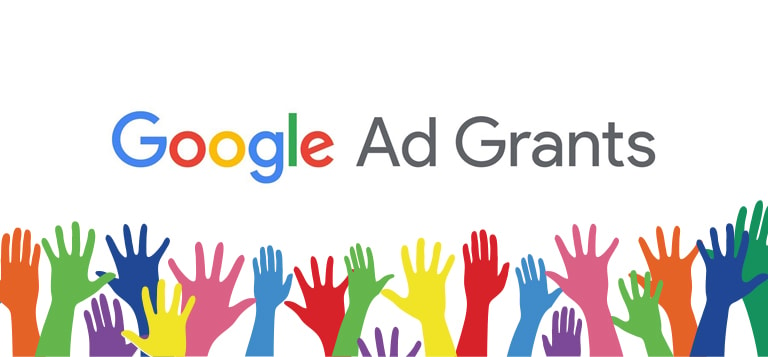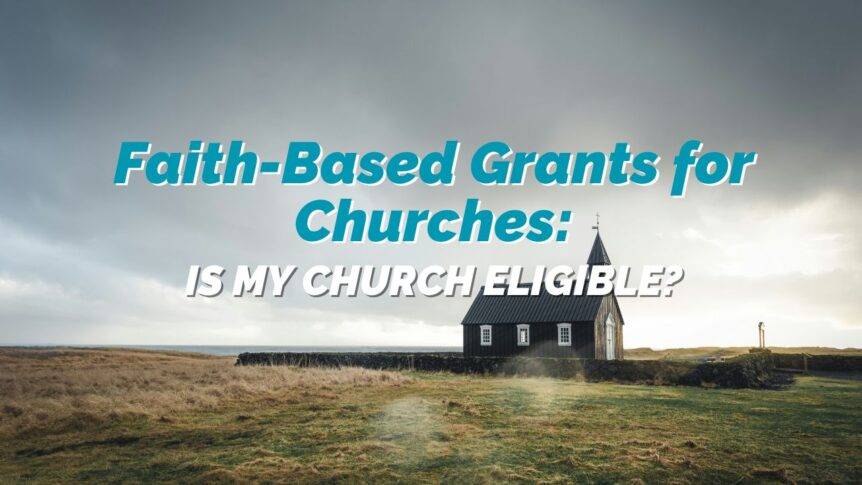- 1. Clearly define your needs
- 2. Identify foundations whose funding priorities align with your proposed project.
- 3. Complete due diligence.
- Private Foundations
- Grants to Help Faith-Based Organizations
What Are Church Grants?

A grant is any amount of money that is set aside through a charitable organization or government agencies. When a grant is awarded to a group, such as a church, it does not have to be paid back, ever. Think of it as a one-time donation, but on a larger scale. Typically a church grant is only awarded to a church when there is a specific need, and the grant money must be used to fill that need.
How Do Non-Profit Grants Work?
When a church is in need – maybe they need grants for church repair, or church grants for adding or building on to their space – they write a grant application. The type of application varies depending on the organization they are applying to. The application will let the organization with the grant know what the church needs the money for. Then the organization will deliberate. In some cases, your church may be applying for the same money as many other churches, so a decision must be made on who needs the grant the most. When the organization decides to award your church the grant, you’ll receive money and you’ll often have to prove that the money was used for the project(s) listed in your application.
Who is Eligible for a Church Grant?

Eligible applicants for faith-based grants for churches typically are available for any church. Specific organizations may have their own guidelines – for example, an organization may say they only offer grants to churches in urban areas. Others may say that they only offer grants to churches with a membership of under 300 people. In both of these cases, these grants are offered to churches where the collection plate may not be able to bring in enough money to cover expensive building repairs.
Searching for a grant that works best for your church may take time, but the best way to start is to search for grants for the specific need your church has. Some grants are specifically created as non-profit grants for building repairs after natural disasters. Others may be specifically created for building onto historic churches. By searching for your specific needs, you’ll find it easier to find a church grant that works for your congregation.
There is one important thing that applies to every church seeking a grant – You must ensure that your church has a 501(c)(3) IRS ruling. This establishes your church as a non-profit organization. You cannot receive grants from either the government or a private foundation if your organization is not a 501(c)(3). Take the time to establish this as you work towards finding the right church grant.
How do I know which grants are worth pursuing?
To determine which grants are a great match for your organization, it is important that you follow best practices for grant research and initiate strategic conversations with prospective donors:
- Clearly define your need/project.
- Identify foundations whose funding priorities align with your proposed project.
- Complete due diligence.
1. Clearly define your needs
It’s imperative to identify as many keywords that describe your project as possible! These keywords will allow you to filter your grant search based on the scope of work, target audience, total project budget, and even potential impact. Your grant research process will require you to think outside of the box. If your organization is seeking funds for salaries or website updates, you might consider searching for donors that support “capacity-building initiatives” or “marketing.”
If you provide after-school programs for K-5th graders, you might filter your search using keywords like “elementary education,” “enrichment programs,” “life skills,” “college readiness,” “literacy programming,” or even “programs for at-risk/high-risk youth.”
2. Identify foundations whose funding priorities align with your proposed project.
Whether you use grant search software, follow leads from press releases about philanthropy in your field or community, or check out the 990s of other organizations that share a similar mission (to see who is giving them dollars). It is important to create a grant prospect list.
3. Complete due diligence.
Before you begin filling out any grant proposal, take the time to read every word in the donor guidelines! Make sure the answer to each of the following questions is “YES.”
- Does the donor’s funding priority align with my project/mission?
- Does the donor fund projects in my geographic location? (Some donors fund nationally, others at a state level, and others limit giving to very specific counties or cities.)
- Does the donor fund projects that serve my organization’s target population?
- Does my organization meet all the “eligibility requirements” listed in the grant guidelines?
- Does the funding cycle align with my proposed project timeline?
- Does this funder support faith-based organizations and/or projects?
The final question is especially crucial for nonprofits with a faith-centered mission or that operate under a faith-based fiscal sponsor. It is important to note that some donors refuse to fund faith-based organizations, period. Others will fund faith-based organizations if the proposed project does not promote a specific religion/theology or discriminate against non-believers.
The Wells Fargo Foundation’s charitable giving guidelines specifically state that they do not fund “religious organizations unless they are engaged in programs that are non-sectarian, benefit a broad base of the community, and have a separate 501(c)(3) designation.”
On the opposite end of the spectrum, you’ll find a myriad of foundations that are committed to ONLY funding faith-based organizations! You can increase the likelihood of finding faith-centered donors during your grant research sessions by using religious terms in your filters such as “Christian,” “Catholic,” “Protestant,” “Lutheran,” “Methodist,” “Non-denominational,” and so on.
Private Foundations
Most private foundations are established by donors who wish to support causes that align with their own core values, personal faith, and social priorities. If a foundation was created by a religious person, it makes sense that they are more willing to fund religious organizations and projects.
For example, the “The CORR Action Fund grant program is established by the General Conference of The United Methodist Church for the empowerment of diversity, inclusion, and racial justice work within and outside the Church.” Many grants are specific to denominations and might require that the proposal be submitted through a church. It’s always wise to connect with churches in your community that already support your organization to see if they might like to partner on a grant like the one listed above!
Be sure to speak with a program officer for every foundation you intend to approach for funding PRIOR to beginning the application process to verify that your organization is indeed a good match.
Faith Based Foundations

Out of all grants made to Christian organizations, 84% came from small foundations with less than $10 million in assets. The top 10 grant makers accounted for 70% of the dollar value of grants to Christian organizations. Foundations funding Christian organizations also made grants to religious organizations, multiservice human service organizations, colleges, international humanitarian organizations, and scholarship organizations.
- The Mustard Seed Foundation
- Bank of America Charitable Foundation
- Wells Fargo Foundation
- The Koch Foundation (Catholic Orgs only)
- The Chatlos Foundation
You can search for exactly what you need on any of these government websites. They provide HUD (Housing and Urban Development) contacts for whatever your project is. Instrumentl is a great website to search state by state for any and all grants.
- HUD
- The Center for Faith-Based and Neighborhood Partnerships (The Partnership Center) in the Office of the Secretary, serves to ensure that Faith-Based and Community Organizations, which form the bedrock of our society, have strong advocates within Housing and Urban Development (HUD), the White House and Partnership Offices throughout the Federal Government.
- Founded in 2015, Instrumentl was built to help fundraisers make the best use of their valuable time and energy. They make the grant process faster, easier, and more efficient, so you can do what you do best – make a positive impact.
The advantages of federal grants for faith-based organizations

6,834 Christian nonprofit organizations received at least $221.9 million in grants for the most recent fiscal year. This includes 6,456 grants made from 3,380 grant-making organizations, with a median grant amount of $1,112. Of these 3,380 foundations, 71% made just a single grant to Christian organizations, and 7% made grants to four or more Christian organizations. This analysis is based on grant-makers that e-file their Form 990s and likely is an undercount of grants.
Federal faith-based initiative programs are not always just about funding. They can also give an organization a number of other advantages and resources that make them an appealing option. Here are a few examples:
- Money. The clearest reason to apply for a federal grant is to expand the organization’s financial resources to fulfill its mission. Federal grants operate as reimbursement programs, meaning the organization spends its own money on qualified activities and then applies for reimbursement under the grant.
- Access to resources. Many grant programs provide grantees with a range of additional tools to help them better achieve their goals. These resources might include training materials, classes, and personalized advice from consultants.
- Networking. Grantees can gain access to a network of other grantees, opening doors to greater cooperation and sharing among like-minded organizations that can assist one-another in fulfilling their goals.
- Image. Some private donors may perceive a successful grant application as a sign that the organization is well-managed and taking advantage of every financial opportunity.
Potential disadvantages of federal grants
Although having more money to work with is a preferred thing, federal grants never come without strings attached. For some organizations the costs of compliance with federal rules may outweigh the financial benefits.
- Compliance. Many grant programs require grantees to submit regular reports, keep specialized accounts, or take other administrative steps that add a significant burden for the organization’s staff.
- Oversight. Government oversight of a religious organization’s activities can give rise to legitimate concerns about state interference in religious affairs. How much monitoring and auditing is done will depend on the program and the administering agency, as well as the attitude of the individual officials tasked with confirming compliance.
- Consequences among donors. Every organization must determine for itself if its significant donors will respond positively to the organization seeking federal funds. Some donors may dislike state entanglement. Others may feel that their dollars may be best spent elsewhere if the organization is receiving help from the government.
12 Grants for Faith-based Organizations

- Grants to USA faith-based organizations for programs related to family, dating, and domestic violence.
- Grants to USA faith-based organizations to improve the lives of people living in poverty.
- Opportunity for USA churches to support their charitable missions through donations of reusable electronics.
- In-kind book donations to USA faith-based organizations to provide underserved communities with reading material.
- In-kind grants of promotional products to USA faith-based organizations to thank donors, attract volunteers, and provide comfort to people in need.
- Reimbursement grants of up to $1,000 to USA churches for the installation of equipment in new or leased Ford or Lincoln vehicles that help people with disabilities.
- Alabama faith-based organizations can apply for $500 grants for programs that focus on the needs of low-income young adults.
- Arizona faith-based organizations can apply for $5,000 grants to support educational and community programs benefiting disadvantaged children.
- California faith-based organizations can apply for grant funding to improve the health and well-being of local residents
- Louisiana churches can apply for $1,000 grants and in-kind support to engage children and families in a reading and discussion program.
- Michigan faith-based organizations can also apply for $10,000 grants to create outdoor play areas for children in Detroit.
- Finally, grants are available to religious organizations in multiple states for programs and services to benefit New England residents.
Grants to Help Faith-Based Organizations
- First, there are grants to faith-based organization and individuals to improve the lives of people living in poverty.
- Reimbursement grants of up to $1,000 are available for equipment for people with disabilities.
- Additionally, grants are available to faith-based groups to provide housing services to veterans.
- Faith-based organizations can apply for a grant to receive donated food and other essential items.
- In-kind grants of promotional products are available to registered charities and faith-based organizations.
- In addition, there are grants to faith-based organizations for activities that address community needs.
- There are also in-kind book donations to provide underserved communities with reading material.
Google Ad Grant

Here at REACHRIGHT, our goal is to help you get the most out of your website and reach as many people as possible. Google gives $10,000 each month to churches who sign up for Google Ad Grants. Check to see if your church is eligible for a faith-based grant here. Hundreds of churches, ministries and missionaries have signed up for this service. REACHRIGHT helps ministries secure and spend the Google for Non Profits Grant. What could your church do with an additional $10,000 each month in your outreach budget?
Related Links:
- How Your Church Can Change The World With Ad Grants
- How To Align Your Team With Your Vision
- Google Grants For Charities – What You Need To Do
- Local SEO Project Details
- 501c3 Church Status – Discover the Pros and Cons
About The Author
Emma Davis
Emma currently lives in Texas where she loves to write, read, and bake. She graduated from Hillsong College in Australia and received her degree in Communications from DBU in Dallas. She uses her passion for writing to communicate the love God has for his people.
